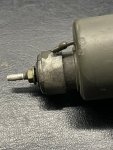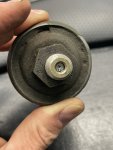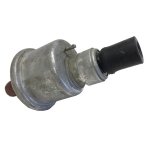I ordered a new oil sending unit as my pressure reads very, very high. As soon as the accessory lever is switched on, the pressure jumps to about 10psi (motor not yet running). On starting, the pressure gauge jumps to about 60 mark (0-120 gauge) and after a moment settles around 90-100 or so. I assume it is a 0-60 sending unit on a 0-120 gauge but I can't tell as it is covered in heavy green paint.
The new unit arrived and I have yet to replace it (waiting on a fitting for coolant related job) but on taking the old one out, I noticed a couple of things I've not seen before. At the tip, there was a small piece of wire and my heart sank until I realized that small piece of wire is captured. It spins around in the tip and cannot be pulled out. The second thing is there is a wire of some sort attached to the side of the sender that may at some point have been soldered to the side of the unit but there is heavy paint still where it would have been attached and there is definitely a gap now.
Question is, what are these and why are they there on the original oil sending unit?
*** EDIT *** I was taking pictures of it from various angles and found some faint indentations in the paint! It is MS24538-1 and I found a big "60" under the paint so I'm pretty sure this is a 0-60 on a 120 gauge and therein lies my reading problem. I'm still curious about the wires, though!
The new unit arrived and I have yet to replace it (waiting on a fitting for coolant related job) but on taking the old one out, I noticed a couple of things I've not seen before. At the tip, there was a small piece of wire and my heart sank until I realized that small piece of wire is captured. It spins around in the tip and cannot be pulled out. The second thing is there is a wire of some sort attached to the side of the sender that may at some point have been soldered to the side of the unit but there is heavy paint still where it would have been attached and there is definitely a gap now.
Question is, what are these and why are they there on the original oil sending unit?
*** EDIT *** I was taking pictures of it from various angles and found some faint indentations in the paint! It is MS24538-1 and I found a big "60" under the paint so I'm pretty sure this is a 0-60 on a 120 gauge and therein lies my reading problem. I'm still curious about the wires, though!
Attachments
-
106.5 KB Views: 19
-
63.7 KB Views: 18
Last edited:




